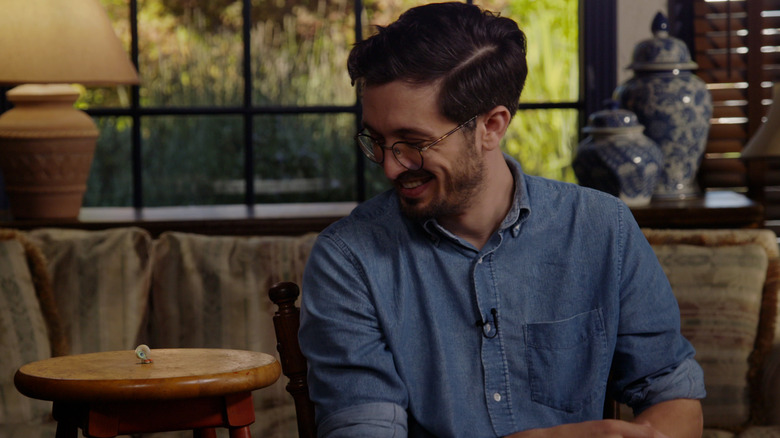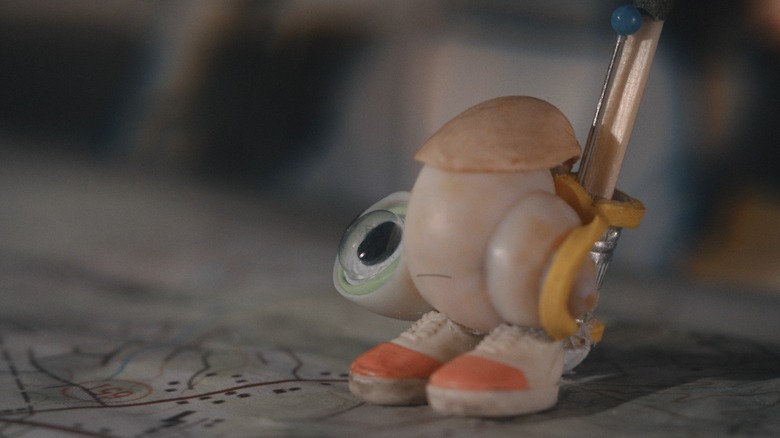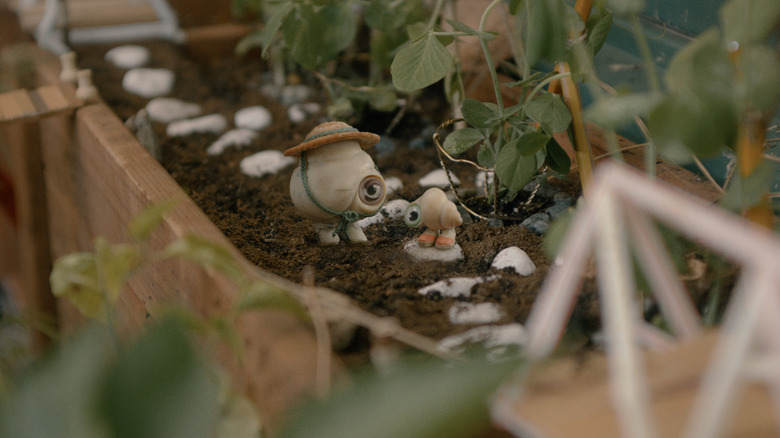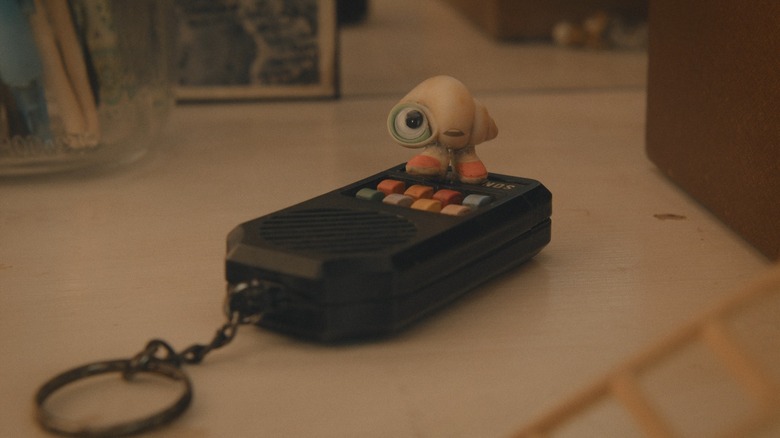Marcel The Shell With Shoes On Director Dean Fleischer-Camp On Finding The Humanity In A Little Shell [Interview]
"Marcel the Shell With Shoes On" started small — a fitting beginning for a character that is no bigger than a person's finger. It began as a kernel of an idea in director Dean Fleischer-Camp's mind, before he turned it into a series of three-minute shorts that he first showed to his close circle of friends before uploading to YouTube. The rest, as they say, is history. "Marcel" went viral, racking up millions of views and capturing the hearts of viewers who loved the little sentient shell and the pearls of wisdom hidden within his mundane ramblings.
So when it came time to turn "Marcel" into a feature-length movie, Fleischer-Camp didn't hesitate.
"The goal was always to turn Marcel into a feature film," Fleischer-Camp told me in an interview on Zoom ahead of the release of "Marcel the Shell With Shoes On," in theaters now. But Fleischer-Camp and his close team of collaborators, which include Marcel voice actor and co-creator Jenny Slate and co-writer Nick Paley, were faced with a new problem: "How do you do it in a way that's holistic with what is special about the character?"
The answer? By going intensely personal.
"As you get older, [it] is harder to stay in touch with [friends]," Fleischer-Camp said. This would inspire the film's delicate storyline, which finds Marcel alone and abandoned in an Airbnb, yearning to reunite with his lost family and his once-thriving community of similarly sentient household objects. "[Communities are] something that divorce and breakups rupture. And it can be hard to stay in touch with them. So it felt special and it felt urgent."
I spoke with Fleischer-Camp about the painfully adorable sentient shell, what could've been with Ryan Reynolds, and getting Marcel's voice just right.
'It felt special and it felt urgent'
All right, so first off, great movie. I laughed. I cried. I was very, very touched. But let's go back to the original "Marcel" shorts.
Yeah.
They are these lovely little three minute vignettes without much of a narrative. What made you think, "I should turn this into a feature film?"
I know it's kind of crazy, isn't it? I sort of love that we were able to do it in a way that is so surprisingly emotional, and that the bar will be so low for people going in because they'll be like, "I remember those silly little wisps of a story, of a character." And then they'll just be emotionally sledgehammered by the film.
I went to film school and the goal was always to turn "Marcel" into a feature film. And I think it took quite a while to figure out how to do it. How do you expand that story from such a small little kernel, and how do you do it in a way that's holistic with what is special about the character?
So "Marcel The Shell With Shoes On," despite starting off as a solo character in a series of shorts, is really all about community and family — or specifically Marcel trying to find his family. Why was this the direction of the movie as you developed it?
In a lot of our early brainstorming sessions about how we expand this character, your immediate thought is, how do we put him in a [movie] ... and also this was influenced by us sort of taking a lot of studio meetings at first, because we didn't know what we were doing. And everyone wanted to adapt this character, but they wanted to do it in the complete wrong way of, "How do we pair him with John Cena and they can fight crime," or whatever. So we were, through that process, forced to — I suddenly felt like, "Oh, okay, we're not going to be able to make the right expansion of this character without taking some time and finding the right people to make it with, and really connecting emotionally with what is personal to us about it."
And we started thinking about, how do we look near instead of far, how do we connect to things that we really feel strongly about? And I think that community is a huge part of my life, and I felt very lucky to have fallen into a scene of people, both at film school and then in comedy clubs around New York when I was living there, and really felt like a community of people that were all doing the same thing, had similar interests, were all trying to make each other laugh and trying to make things, like good art, trying to top one another. And that so fully formed my early artistic experience much more than going to film school did.
And even "Marcel," for example, was one of 100 shorts that I had created over the course a few years to screen at friends' comedy shows. And that is something that I think, as you get older, [it] is harder to stay in touch with [that community] and is something that — this is getting into the personal side of the film as well — but is something that divorce and breakups rupture. And it can be hard to stay in touch with them. So it felt special and it felt urgent.
'Did we get pitched Detective Pikachu, and they finally found a character?'
What were some of the rejected pitches that came from the studio?
There definitely was one where a studio had suggested that we partner him with Ryan Reynolds and they fight crime together.
Oh no.
I know. And then a few years later "Detective Pikachu" came out and I was like, "Did we get pitched 'Detective Pikachu,' and they finally found a character?" But anyways, there was that. There was Marcel, "Babe 2: Pig in the City" kind of style, Marcel getting lost in Paris. There was a whole thing we fleshed out where he's attending a school for music called the Academy of Toons, and they just all felt pretty wrong. And I remember, we brought on Nick Paley who worked on the story with us and co-wrote it with us, because ... Nick and I had both came from editing, and ... we met editing on TV shows together. But he has such a great grounded sense of scale and how to keep things emotionally big, but within limited means a little bit. Kind of terrestrial means without having to blow it out. There's also — do you know Robert Bresson, the French filmmaker?
Yes.
He published, at some point, this collection of notes that he made over the course of his career. And some of them are very mysterious and I don't know what they mean, but one of them is something like — I'm paraphrasing, I'm probably butchering this, but — "Always ask yourself what will suffice." Meaning, if you're at a motorcycle chase, ask yourself, "Does it need to be a motorcycle chase or can it just be two people who are chasing each other around a grocery store on foot? Or can it just be a series of text exchanges? How small can you get it and still get the same emotional substance out of it?"
And so I think we had that tacked up on our wall while we were writing this and just trying to figure out, "How can we always make it small, make it small," because the small things are already big to a character like "Marcel."
'It's about a loss of connection'
So speaking of intensely personal, deeply emotional elements of this film, there's also the theme of aging, especially through the character of Connie, played by Isabella Rossellini. First, how did you get Isabella Rossellini in your movie about a talking shell? And second, can you speak about why this character and this sort of disarmingly melancholic element of Marcel having to be the caretaker for Connie, why that was important to the overall narrative?
I'm trying to remember which came first, but it was important to the overall narrative because it's about a loss of connection. And Marcel, for the time being, when the movie starts, still does have this one lifeline to his community and to his identity and family, which is Connie. And we thought, "Well, that is not something that is stable. That's not something you can hold onto forever, or depend on forever." And I think, all of us — me, Nick, Jenny, Liz, who really were the brain trust of the film — are at an age where that is starting to happen in our lives. And I lost both of my grandparents over the course of making the film. And I think watching that happen can be devastating if you're very close to those people, because it's a double loss. You might lose that person, at least what you remember of them and what they remember of you, long before you actually lose them. And it can be very scary and startling. And so I know it came from a personal place.
We got really lucky that Isabella, I think, is a true artist in the sense that she just wants to — she has offers that she turns down constantly, but she just wants to do things and make work and make art in ways that she's never tried before. And I don't think that she had done a movie like this before, and I think [she] was just drawn to it for that reason. And we really lucked out because of that, because so much of what is special and that I love about Nana Connie was really something that Isabella brought to the character or something that Nick and I really loved about Isabella as a person. What made her so special and funny and creative, and that we then were able to kind of write around what we loved about her. For example, the gardening aspect of her personality.
I think Isabella brought definitely a strength and a kind of funny bluntness. And she really loves and talks about nature in a way that doesn't romanticize it, which is maybe my favorite thing about Nana Connie. And we had started incorporating that gardening stuff, partly because Nick's grandmother had died. He found a gardening diary and he didn't even know that part of her personality at all. And so that was sort of the original inspiration.
But then we lucked out, and Isabella literally lives on a farm and knows so much about gardening and farming. She has a master's in animal behavior. And so it was just this wonderful coincidence. And then she brought so much color and texture to that. And you can still hear some of the B-roll, like when we cut to her showing me her strawberry and stuff like that, some of that is literally just Isabella showing me around her farm. Me just recording, being like, "What's that?"
'There's an emotionality in stop-motion that you can't find elsewhere'
So Marcel has such a distinct way of speaking that's childlike and a little stilted, which makes his little pearls of wisdom hit all the harder. How did you come up with that specific diction for Marcel, or was that Jenny who came up with that during the performance of it?
That's a really great question. I don't know how much of that — certainly the voice came first in the character. The short was built around that voice Jenny was doing. But I do think it's evolved to be some sort of weird combo of both of our personalities. I definitely think Jenny's diction has a lot to do with the way he talks about things. I think we both think it's really fun and funny to describe familiar objects or things from an outsider's perspective. And that's why it was so fun to take Marcel out in the car, or out into the world and introduce him to all these new things. One of the things that I love about Marcel's personality is, I don't think that he's a child but he does have a childlike wonder and curiosity. That curiosity is so inspiring to me.
It almost reminds me of, I once took an Amtrak trip across country with Nick Paley. And on Amtrak trains, you meet a lot of Amish people because I think they're not allowed or permitted to use cars, but they can use trains. And so we met a lot of Amish kids and they're all so fascinated with like, "Oh, can you show me your weather app on your iPad?" Or, "Can you show me..." They've seen technology, but they know it's not for them. And it's kind of beautiful and heartbreaking because there's this curiosity that's, like anything that's off limits, it's the coolest thing you've ever heard of. But at the same time, there's a melancholy or something because there's a sadness that they know those things aren't for them. And that they'll never get to have those things — or at least not without great cost. And so there's just a beautiful dynamic there that I wanted to make sure we hit that with Marcel or portrayed that.
So I want to talk about the stop-motion animation process for this movie. What is it about stop-motion that provides something that other types of animation do not? And what was the difference between animating for these little three-minute stop-motion videos versus a feature length film, but with a bigger budget, of course?
I think there's always a danger when you have a bigger budget, or when you're making something, that with that bigger budget, with that polish, you might accidentally sand off all the things that made the original cool, or the low-budget version cool and special. And so I was very much trying to keep my eye on, "How do we expand this, how do we make it better without making it lesser?" And a lot of that came down to ... the process was completely different, because the shorts were just me in my apartment animating, really. If you watch them, you can tell I have no idea how to animate and I'm doing my best. But this process was obviously a much more structured and much larger team with animators who are incredibly talented and can animate in completely, beautifully fluid ways.
So a lot of, I think, mine and [animation director] Kirsten [Lepore]'s job boiled down to saying, "This is beautiful, but it's not Marcel. Can you animate this with your left hand?" A little bit like, "Can you do a worse job?" But also just refining — I think the things that are lo-fi or charming about the original and about how bad that animation is, Kirsten and I went through a process of really identifying, kind of quantifying, "What are the things that want to keep from that? Do we want him animated on ones or twos? Do we want him to be able to turn his head all the way around? Do we want him to be able to jump, or how exaggerated do we want his movements?" And so we went through a real process and we created a bible for the animators about how Marcel moves. He can turn his foot 30 degrees, but not 45. Those kind of really minute things that make up an aesthetic.
I always thought it was really important that we commit to stop-motion because it has a fallibility that I think is very emotional, actually. And Marcel is such a vulnerable, little guy in a big world. That vulnerability felt important in order to emote that, or to express that.
Stop-motion is such a hands-on, true tactile process that you get all these little mistakes in there that are, I think, just very human. And you would never be able to achieve that — even though you can pretty well mimic the aesthetic of stop-motion with a CG process, you can't bake in mistakes that you wouldn't be able to anticipate. And so I thought that was important for the character. There's an emotionality in stop-motion that you can't find elsewhere.
"Marcel the Shell With Shoes On" is in theaters now.



